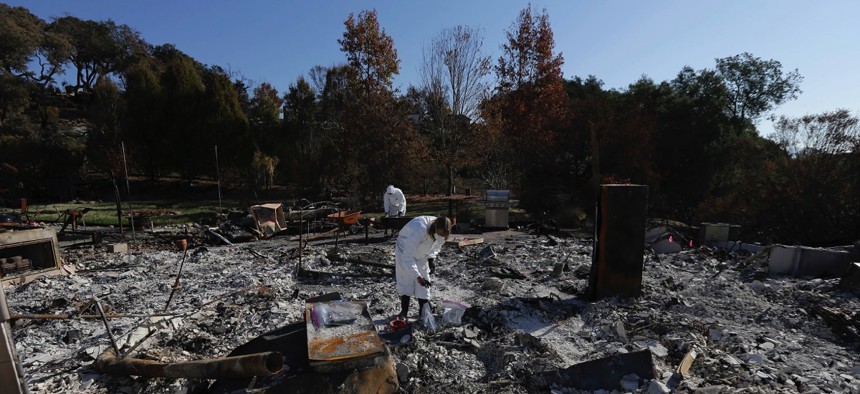Connecting state and local government leaders
FEMA’s administrator envisions state and local governments taking control of reconstruction and resilience with federal support.
WASHINGTON — State and local governments should own the disaster recovery process by creating integrated, outcome-based mitigation plans like Puerto Rico post-Hurricane Maria, the Federal Emergency Management Agency’s administrator said Thursday at a congressional hearing on Capitol Hill.
To that end, Brock Long asked the House Appropriations Committee for additional authority in FEMA’s third supplemental request for $44 billion to go beyond simply rebuilding communities to pre-disaster standards, per the Stafford Act, and address resiliency.
Too often FEMA finds itself in the role of first responder and even the only responder, Long said, as was the case in Puerto Rico, which faces massive amounts of deferred maintenance on antiquated infrastructure and its energy grid in particular. The average age of power plants in the U.S. commonwealth is 44 years, compared to the national average of 18.
“It is time to question what is FEMA’s role in disaster response and recovery. What can we adequately handle as an agency versus what the real roles and responsibility of the whole community should be from state to local governments?” Long said. “And let’s hit the reset button. Let’s carve out what every level of government and the whole community should be responsible for.”
Long presented FEMA as an agency “tapped out,” juggling 31 disasters across 21 jurisdictions over 97 days—the longest activation in its history.
Hurricanes Harvey, Irma and Maria, along with the California wildfires, have affected 25 million people and placed 5 million in the Individual Assistance Program, which is more than hurricanes Katrina, Rita, Wilma and Sandy combined and a tenfold increase on 2016. About 80,000 people were put up in hotels in Texas alone after Harvey flooded 150,000 homes and 200,000 apartments, and since Aug. 25 FEMA has required $42 billion.
“A lot more has to be done. Without even directly addressing the Disaster Relief Fund, I want to say at the outset that the Office of Management and Budget’s request is woefully inadequate,” said U.S. Rep. John Culberson, a Texas Republican. “It’s embarrassing. It’s deeply upsetting to the people of Texas to see that [facing] the largest housing disaster in the history of the United States of America, there’s not one dime recommended for housing relief in the OMB’s request.”
The FEMA administrator said the National Flood Insurance Program is “structurally broken” and continually in debt as a result, arguing federal support should be streamlined through governors and local officials.
Federal funding comes from too many agencies with little oversight of who is entitled to what and how to use it, Long said, which breeds confusion at the lower levels of government.
“I ultimately believe that resilience lies in the hands of local elected officials through building codes and proper land use planning,” Long said.
“I don’t know how to fix your state better than you do,” he added.
Currently, states and localities must be hit by a disaster to receive Section 404 mitigation funds, according to the Stafford Act—a “regressive formula,” Long said. Whereas, if that money was moved elsewhere, jurisdictions could plan out mitigation strategies ahead of disasters and receive grant funding.
Long also defended states creating rainy day funds so they have some form of relief in the event a disaster declaration is slow to be made or never comes, as has been an issue in rural Washington state with wildfires FEMA’s formula fails to cover.
“I think if we make a real community improvement, then all these states need to have rainy day funds that are designed similar to the assistance that we put forward,” Long said.
Other provisions the FEMA director suggested included ensuring states and large cities have their own ability to distribute water and food and developing a low- to no-cost means of educating the public on disaster preparedness: CPR skills, shutting off water valves and obtaining flood insurance.
With the California wildfires, one of the biggest problems has been homeowners who allowed their insurance, “the first line of defense,” to lapse, Long said. In many cases there’s nothing to rebuild, unlike with hurricanes Harvey and Irma, where the question is often whether to rebuild flood-damaged homes or bring in new, manufactured ones.
Puerto Rico adds the logistical complexities of being an island.
“It simply is not acceptable to restore infrastructure and public facilities to pre-disaster conditions, especially in Puerto Rico which suffered unprecedented damages. We must use assistance funding to mitigate the impacts of future disasters or else we will find ourselves in this exact position in short order, when the next hurricane blows through, forcing taxpayers to pay more because investments were not made at an appropriate time,” said U.S. Rep. Nita Lowey, a New York Democrat. “Resiliency is the only sensible path forward.”
Dave Nyczepir is a News Editor at Government Executive’s Route Fifty and is based in Washington, D.C.

NEXT STORY: How Do You Tell Tens of Thousands of Parents Their Children May Lose Health Coverage?




